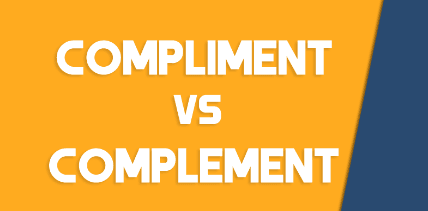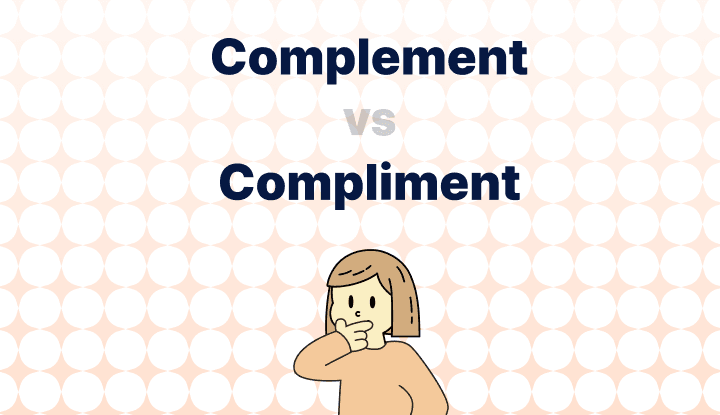The Power of One Letter: Differentiating Complement from Compliment
Contents

English is a vast, complex language that often confuses even seasoned learners. One such common confusion is distinguishing between 'complement' and 'compliment'. Seemingly identical, they can be mixed up quite easily, especially for non-native English speakers in India.
But don't worry, you're not alone in this struggle. Many of us often interchange 'complement' and 'compliment' without realizing the difference in their meanings. You might have heard sentences like "Your saree nicely complements your earrings" or "My boss complimented my presentation" but never really understood the distinction. This article will help unravel the difference between 'complement' and 'compliment'.
So let's delve into this interesting topic and untangle the confusion between ‘complement’ and ‘complement’. With practical examples and simple definitions, we'll demystify these commonly misused words for you!
What Are Complements and Compliments?
Firstly, let's define 'complement' and 'compliment'. A 'complement' often refers to something that completes or enhances another thing, making it perfect. For instance, you could say, "The marigold garlands are a great complement to the Diwali decorations."
On the other hand, a 'compliment' is a polite expression of praise or admiration. An example would be, "Raj received several compliments on his fluent English presentation at work."
Intriguingly, both words originate from the Latin complēre which means "to complete". Their common roots highlight their shared theme of "completion" but in different contexts.
Understanding these subtle yet significant differences between 'complement' and 'compliment' will pave your way towards mastering English language nuances!
What is the Confusion Between Complement and Compliment?
'Complement’ and ‘compliment’ are two words that often trip up both learners and even some fluent speakers of English. The primary reason for this confusion stems from their striking similarity in spelling and pronunciation. With just one letter differentiating them, it's easy to mix them up! Here's how you can solve this confusion in terms of English grammar:
Complement:
In grammar, a complement is a word or group of words that completes the meaning of a verb, adjective, or another adverb in a sentence.
Complements often come in the form of direct objects, indirect objects, or predicate nominatives.
For example, in the sentence "The soup tastes delicious," 'delicious' is the adjective complement.
They provide essential information to make the sentence grammatically correct and convey the intended meaning.
Compliment:
A compliment, on the other hand, refers to a polite expression of praise or admiration.
In grammar, it typically does not have a structural role within a sentence but serves to convey positive sentiments.
Compliments are used to express approval, esteem, or admiration for someone or something.
A great way to cement your understanding is through YouTube tutorials which provide detailed explanations along with practical complement vs compliment examples.
How to Identify When to Use Complement vs Compliment?

Navigating through the nuances of English can be a tricky journey, but with a simple trick, you can quickly distinguish between 'complement' and 'compliment'. Here's a mnemonic device: think of the 'e' in 'complement' as an 'enhancer', reflecting how one thing complements or enhances another. The 'i' in 'compliment' can stand for 'impressive', suggesting praise or flattering remarks.
Let's contextualise these definitions through some scenarios:
Complement: Imagine you're at a Diwali party. Your Kurta's colour complements the festive decorations, meaning it enhances or completes the overall look.
Compliment: On that same occasion, a guest compliments your Kurta, saying it's impressive and looks good on you.
Here are some more examples of using complement and compliment in sentences:
Complement:
The scarf complements her outfit perfectly, adding a pop of colour.
Adding fresh herbs to the dish can complement the overall taste and aroma.
Compliment:
Sarah received a lovely compliment on her new haircut.
The manager complimented John on his excellent presentation skills.
Armed with these mnemonic devices and examples, you'll effortlessly differentiate between complement and compliment, enhancing your English fluency. Remember, practice makes perfect. So, don't shy away from using these words in your everyday conversations!
Activities to Reinforce the Difference Between Complement and Compliment
Let's take your understanding of the meaning of 'complement' vs 'compliment' a notch higher with some interactive exercises.
Fill in the blank with the correct word:
Your shoes really _______ your outfit.
She gave me a wonderful _______ on my presentation skills.
The spices _______ each other in the biryani, enhancing its flavour.
At work today, I received a _______ for completing the project on time.
After you are done marking the answers by yourselves, check whether they are right. Here are the answers:
1. Complement
2. Compliment
3. Complement
4. Compliment
If you're unsure about any of these, don't worry! Keep practising these complement vs complement examples until they become second nature to you. Remember, nobody becomes an expert overnight.
We also suggest saying these sentences out loud with an English-speaking friend or mentor for real-time feedback - it’s a great way to gain confidence and perfect your pronunciation! Need help finding a language partner? For practical tips, check out our guide: How Can I Find An English Learning Partner?
Remember, practice makes perfect! Keep revisiting the complement vs compliment examples and definitions until you no longer confuse the two terms.
Summing Up
In the journey of mastering English, understanding the meaning of complement and compliment is indeed a significant milestone. The subtle differences in meaning, pronunciation and usage can make a tremendous difference to your communication skills. Remember, a 'complement' enhances or completes something else, while a 'compliment' is an expression of praise or admiration.
Mastering proper language usage like this can elevate your professional conversations and add finesse to your personal interactions. For more tips on honing your English speaking skills, do visit the blog post: Top 5 Ways to Hone Your English Speaking Skills.
We understand these nuances can be tricky to grasp and that's where Clapingo can help. With Clapingo's one-on-one coaching sessions, you get personalised attention from experienced tutors who guide you through these language barriers with ease.
So why wait? Dive into the world of fluent English with Clapingo’s personalized coaching sessions and give your communication skills a robust boost.
FAQs
1. What is the difference between complement and compliment?
Complement refers to something that completes or enhances another thing while compliment is a polite expression of praise or admiration.
2. Can you give me an example of complement vs compliment in a sentence?
Sure! For complement: "Her dress perfectly complements her blue eyes." For a compliment: "He complimented her on her eloquent speech."
3. Does pronunciation differ for ‘Complement’ and ‘Compliment’?
No, both words have the same pronunciation but different meanings and uses.
Comments
Your comment has been submitted